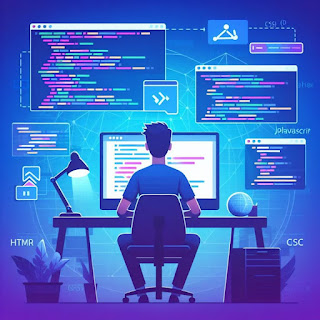The Future of Web Development: What Every Beginner Should Know
The Future of Web Development: What Every Beginner Should Know
Web development has come a long way — from static HTML pages to powerful single-page apps powered by AI and cloud technologies. As we step into 2025, the web is evolving faster than ever. But what does this mean for beginners? Is it too late to learn? Which technologies are still relevant?
The truth is: there’s never been a better time to start learning web development.
In this blog, we’ll explore how the industry is changing, what skills matter most, and how beginners can prepare for a future-proof career in web development.
🚀 Why Web Development Is Still the Best Career Choice in 2025
Despite the rise of no-code platforms and AI tools, the demand for skilled web developers is only increasing. Here's why:
-
🌍 Every business needs a strong online presence
-
📱 Mobile-first and responsive design is now essential
-
🔐 Security, performance, and accessibility are business-critical
-
💼 Freelance and remote work opportunities are booming
-
🔄 Continuous innovation = continuous demand for new talent
Whether you're in Pakistan or anywhere in the world, web development skills can open global job and
freelance markets for you.
🔮 Key Trends Shaping the Future of Web Development
1. AI-Powered Web Development
Tools like GitHub Copilot, ChatGPT, and AI website builders are changing the way we write code. But instead of replacing developers, they’re becoming powerful productivity tools.
✅ What to do as a beginner:
Learn to write clean, well-structured code — and use AI as a coding assistant, not a crutch.
2. Component-Based Frontend Frameworks
Libraries like React.js, Vue.js, and Svelte have taken over traditional HTML/CSS workflows. Modern web development is component-driven, modular, and state-managed.
✅ What to learn:
Master JavaScript and then move to React — it’s the most in-demand skill in the market today.
3. Jamstack & Headless CMS
Websites are becoming faster and more scalable using modern architecture like Jamstack, Next.js, and headless CMSs (e.g. Sanity, Strapi, Contentful).
✅ Tip for beginners:
Focus on frontend skills first, then slowly explore these modern approaches.
4. Progressive Web Apps (PWAs)
PWAs act like mobile apps but run in browsers — with offline support, notifications, and app-like speed.
✅ Why it matters:
Businesses love PWAs because they save money and deliver a great user experience.
5. Web3 & Blockchain Integration (Emerging Area)
While still niche, Web3 development is gaining traction — especially in fintech and crypto startups.
✅ Not essential for all, but worth watching if you’re interested in tech innovation.
🧰 Future-Proof Web Development Skills for Beginners
To succeed as a modern web developer, beginners should focus on:
| Skill Area | What to Learn First |
|---|---|
| HTML & CSS | Structure and styling basics, responsive design |
| JavaScript | DOM, functions, arrays, events, ES6+ features |
| Version Control | Git + GitHub for collaboration |
| Frontend Framework | React.js (or Vue.js) |
| Basic Backend | Node.js, Express, Firebase |
| APIs | RESTful APIs and integration |
| Hosting | Netlify, Vercel, GitHub Pages |
💡 Tip: Start simple. Build small projects. Then scale.
🎓 Where Should Beginners Learn These Skills?
If you're looking for a trusted, beginner-friendly platform in Pakistan, ITCians offers:
-
Project-based training in frontend and full-stack Web development
-
Focus on React.js, GitHub, Firebase, and real projects
-
Freelancing & client-handling skills
-
1-on-1 mentorship to help beginners start earning quickly
Many students with no coding background have become junior web developers and freelancers within just a few months.



Comments
Post a Comment